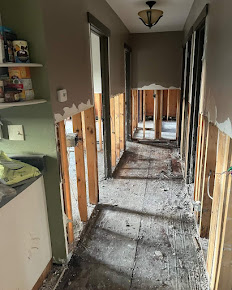Rescued by the bucket of a bulldozer during historic Vermont flooding
By Jennifer Costa, Regional Communications Director
“When I lay down to sleep at night and I shut my eyes, I see myself back there.”Jae Basiliere’s Johnson, Vermont home sits along the Lamoille River. Three weeks ago, the typically tranquil waters rose rapidly causing catastrophic flash flooding across the state.
It was 4 a.m. the first time Jae called for help. Jae’s wife and a family friend were home too.
“At that point there was about a foot-and-a-half of water just standing in the home. So, I called 911. They said they would get to us as fast as they could,” Jae remembered.
But the water kept coming. Thirty minutes after their first call to 911, Jae was standing knee-deep, watching as everything they owned was swallowed up by the murky water.
“By 5 a.m., so an hour after we first woke up, the water was chest height in the house. I called 911 again and they explained that our road was so flooded that they were having a hard time figuring out how to get to us,” Jae said. “While I was on the phone with 911, our refrigerator, floated up, tipped over and started smoking and sparking. I just screamed into the phone, ‘I think something’s on fire.’”About five minutes later, rescuers arrived in a bulldozer and made their way to the trapped trio. Miraculously, they were able to get the machine right up to the front porch and lower the bucket to the water line, which was now about four to five feet high.
“We had three humans and three dogs that we put into the bucket of the bulldozer,” Jae said. “The bulldozer took us down to Main Street. From there, we got a ride up the hill to the college where they had an emergency shelter in place.”
More than 300 trained American Red Cross disaster workers deployed to Vermont to help with the response and recovery efforts. Since the storm hit, the Red Cross and our partners have provided 966 overnight stays for more than 191 displaced residents between four emergency shelters. We’ve provided nearly 28,000 meals and snacks – and more than 34,000 relief items, like comfort kits, clean-up kits and other emergency supplies to flooding survivors across the state.“The Red Cross has been everywhere. I have personally taken advantage of the resources,” Jae said before pausing to check-in with the Red Cross disaster assessment team walking up their driveway.
“So that is the waterline indicating how high the water was in our house when we got out,” Jae explained, pointing to a dirt line across the front door.
The Red Cross has had more than a dozen of disaster assessments teams working across the state, surveying the flooding impacts and conducting more than 4,000 door-to-door external residential assessments to determine how many homes have been destroyed or suffered major damage. This critical information is then used to help plan for what support – including financial assistance – families may need.
“We’re seeing a lot of heavy, heavy damage,” said John Lanzetti, a lead disaster assessment volunteer who travelled to Vermont from Florida. He’s deployed nearly 50 times with the Red Cross in the last nine years.
“We’re in Johnson today – and the damage along the rivers is pretty bad, but we are here to help,” he said.
“I have seen Red Cross workers on our street, three or four times a day. Many of them know my name, know my story, and address me by name when they see me,” Jae said. “I think it’s been really valuable to our community to have that Red Cross presence here.”As Jae and so many other Vermonters begin to pick up the pieces, it’s important to remember that emotional recovery is just as vital as the physical rebuilding.
“It’s taken a toll on me,” Jae said. “I think everyone who has gone through this needs mental health support right now.”
The Red Cross has about 50 disaster health and mental health volunteers assigned to this operation. They are available to help people process and talk about their disaster-related trauma as well as connect them with community resources to support their long-term recovery.“This is hard and it’s horrible, but I feel really, really lucky to live in the community that I do and to have the network that I do,” Jae concluded. “I am hanging in there. I have just been surrounded by such community love and support.”
If you’ve been affected by recent flooding and need help, please call 1-800-RED CROSS.







%20(1).jpg)
Comments
Post a Comment